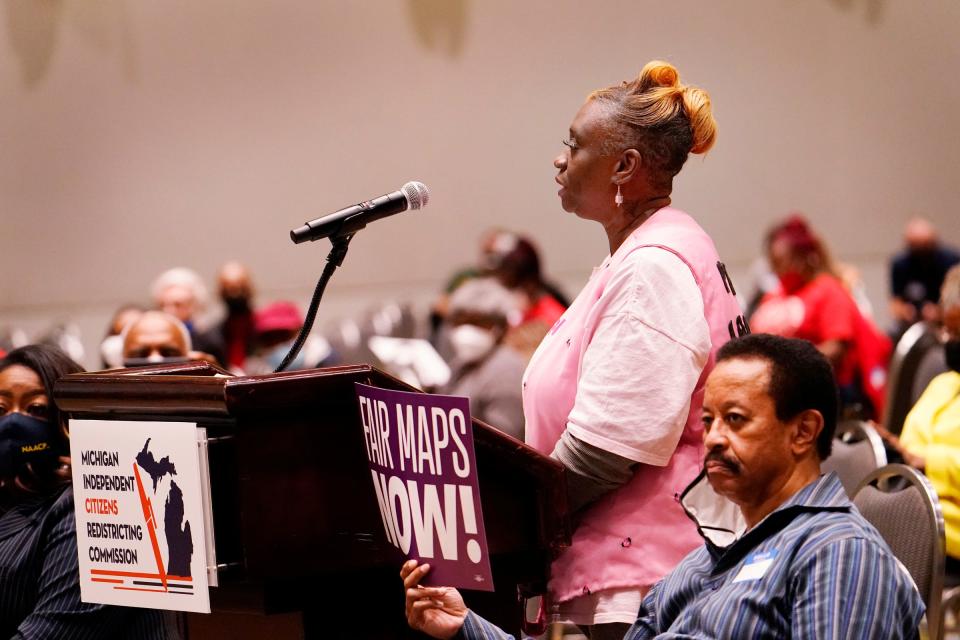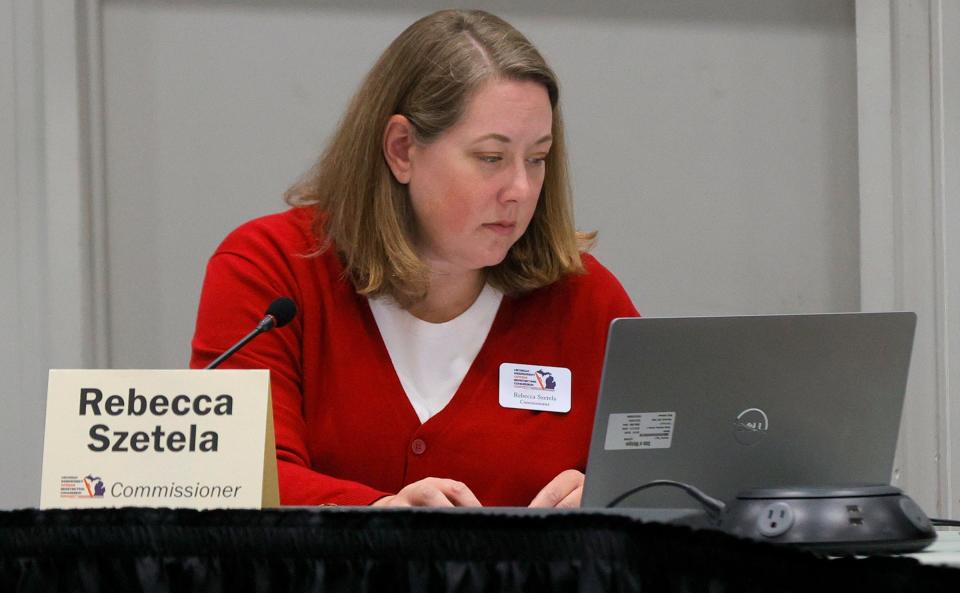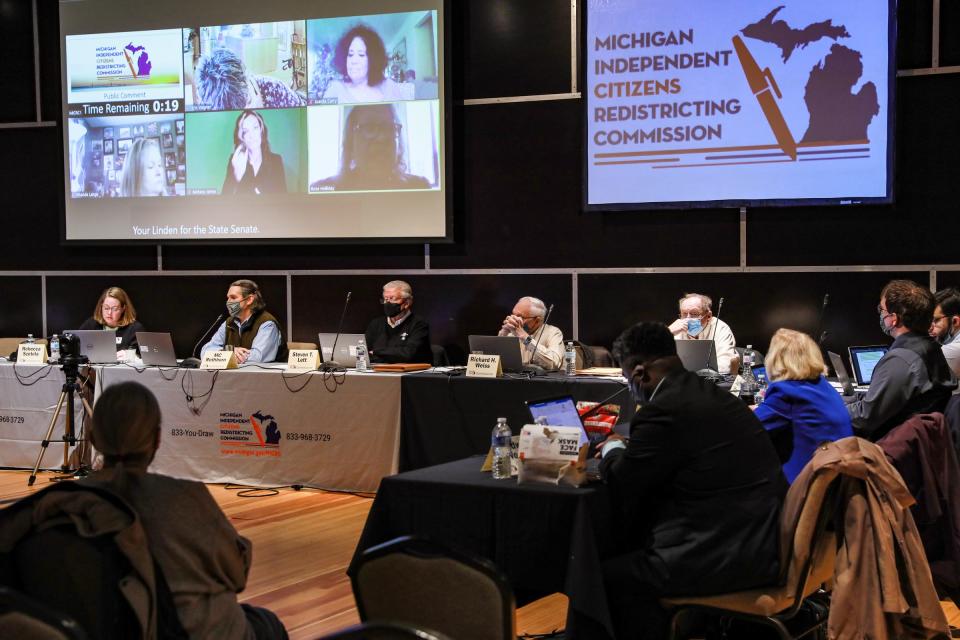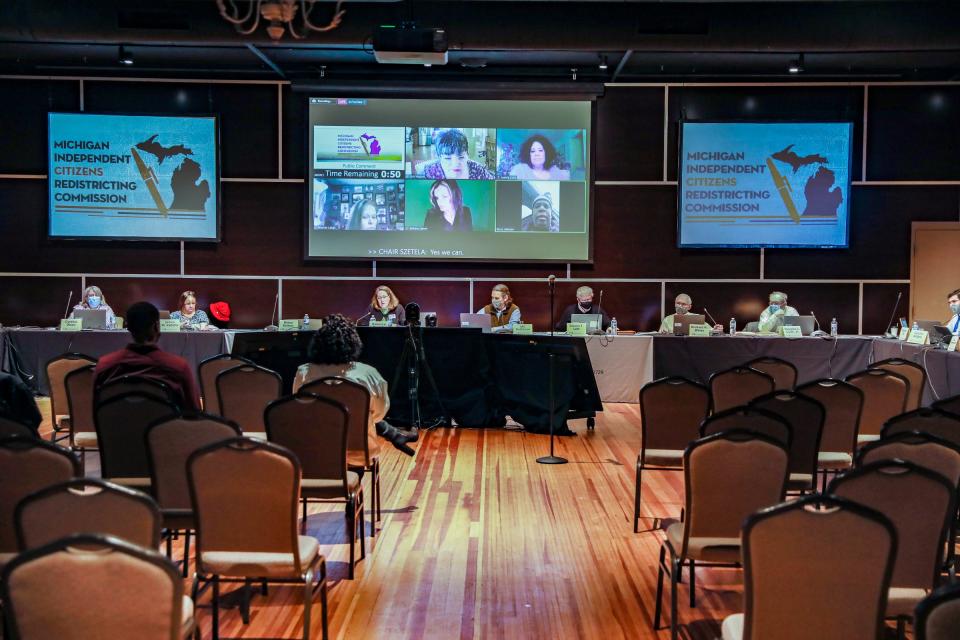Judges could decide one big question in Michigan redistricting lawsuit
KALAMAZOO — It's not clear a suit-clad career political operative invoking Eminem in a drab federal courtroom in west Michigan is what the metro Detroit rapper had in mind during the filming of his hit biopic "8 Mile."
But that's exactly what happened during the trial in a redistricting lawsuit challenging state legislative districts that run through Detroit brought by a group of voters in the area.
When he took the witness stand, former state Rep. LaMar Lemmons III said the white rapper crossed Eight Mile to gain a cultural experience in Michigan's largest — and majority-Black — city to launch his musical career. Lemmons and others spoke of the significance of Detroit's northern boundary and the county line that separates the city from suburban Oakland and Macomb counties during the federal trial in the case.
By drawing state legislative districts that cross it, Michigan's citizen mappers eliminated majority-Black districts in the state Senate and reduced the number of such districts in the state House. The legal challenge to the commission's work alleges that the new lines illegally disenfranchise Black voters. Lawyers for the commission counter that the new lines were drawn to reflect population trends in metro Detroit, provide opportunities for candidates preferred by Black voters to win, achieve fair maps and pair communities that share legislative priorities.
The lawsuit marks the most significant test to the new citizen-drawn maps.
A three-judge panel made up of appointees of former President George W. Bush, a Republican, will decide whether the commission must go back to the drawing board and rework more than a dozen state legislative districts.

The bulk of the court proceedings became a kind of metro Detroit geography lesson and an academic debate about statistics and political science methodology.
"This isn't a math test," said plaintiffs' attorney John Bursch at one point after asking an expert witness for the redistricting commission to calculate averages while she sat on the stand. "Could have fooled me," said Judge Janet Neff, one of the judges serving on the panel.
But in his closing argument, Bursch told the judges that while the trial has focused on numbers and expert testimony, the lawsuit is fundamentally about the rights of Black voters and candidates.
The trial began with some emotional testimony from commissioners who shared accounts of the stress they endured while drawing the lines but offered different recollections of how they considered race while mapping Detroit.
Redistricting commissioner testifies against group's mapping work
Independent redistricting commissioner Rebecca Szetela started the trial with testimony undermining the mappers' work, saying their line-drawing became "100% about race." She told the panel of judges she thinks the commission should redraw metro Detroit districts. While two of the Republican commissioners who testified largely shared Szetela's account, other commissioners said that race was one of many factors the group considered while drawing the lines. Those suing the commission allege that race predominated in mapping metro Detroit districts in violation of the U.S. Constitution.
During her testimony, Szetela said that during a closed-door meeting with the group's attorneys in the middle of the mapping process, she felt like the mappers were instructed to lie about their decisions about where they drew the lines, covering up the real reason for moving Black and white voters between districts.

Bruce Adelson, the commission's voting rights attorney, called Szetela's testimony "offensive" and said the idea that he controlled the mapping process was "ludicrous and beyond the pale."
Szetela also testified that she was told the commission's lawyer instructed other staff members to keep secret from the mappers concerns with the metro Detroit maps that the group's voting rights analyst shared during a staff meeting. Szetela wasn't at the meeting and was either misinformed or misunderstood what happened, the commission's analyst Lisa Handley said. Handley testified she didn't convey in a staff meeting concerns about the low share of Black voters in the draft districts drawn by the commission or indicate that the group needed to draw majority-Black districts.
Detroit districts: Michigan redistricting trial concludes, judges to decide fate of Detroit-area maps
What did the commission know and when?
Redistricting experts deem an election "racially polarized" when white and Black voters prefer different candidates. Early in the commission's mapping process, Handley presented her analysis of racial voting patterns in Michigan.
She looked at general elections and the 2018 gubernatorial primary — the sole contested Democratic statewide primary election — during the previous decade. Black voters did not have a clear preferred candidate in that primary, according to Handley. But in Wayne and Oakland Counties, she identified general elections in which voting was racially polarized, a finding that triggered conversations among commissioners about the racial demographics of the districts they drew.
It wasn't until the commission was poised to vote on the final maps that they received Handley's review of racial voting patterns in state legislative primary races.
Bursch called Handley's previous general election analysis "completely worthless" and said the absence of primary data was "frankly negligent." It shouldn't have been used to justify the extensive conversations the commissioners had about racial demographics in metro Detroit districts, he said.
The real question the commission needed to answer is whether Black and white voters prefer the same candidate in primary elections in metro Detroit because the primary typically decides who will win the general election in heavily Democratic districts, Bursch said.

As the share of the Black voting age population in a district declines, candidates preferred by Black voters may have a harder time winning Democratic primaries if white and Black voters prefer different candidates, Handley wrote to the commissioners in her report for the group's meeting to approve the final maps. "Unfortunately, it is not possible to ascertain exactly how much more difficult it would be or even if it would be more difficult given the lack of Democratic primary election data," she wrote.
During the trial, Judge Raymond Kethledge asked several questions about the timeline of Handley's work for the commission, trying to pin down what data the mappers had access to and when as they drew the lines.
Handley told the panel that her final analysis for the commission, which included the review of state legislative primaries, wouldn't have fundamentally changed what she told the commission from the outset of drafting Detroit districts: The commission didn't need to draw majority-Black districts in order for candidates preferred by Black voters to have a shot at winning. She also testified that she didn't identify a consistent pattern of racially polarized voting in primary elections.
Determining when Black voters back same candidate
Analyzing whether white and Black voters' prefer different candidates in an election requires identifying which candidates each racial group chooses or "candidates of choice" in redistricting lexicon.
That's not always straightforward, especially in a primary election with more than two candidates, said Boston University political science professor Maxwell Palmer during his testimony in the redistricting trial.
For instance, in a three-candidate primary field where 40% of Black voters back one candidate, 35% a second candidate and 25% another, is there a candidate of choice among Black voters? One candidate received a plurality of the votes cast by Black voters but a majority of Black voters supported someone else, Palmer said.
Experts who testified in the redistricting case didn't always agree on whether there was a clear candidate of choice among Black voters in metro Detroit Democratic primaries.

Kethledge said he's not aware of any other case where the court must decide what it means for voters to be cohesive in a multicandidate primary. "This may be the first case," he said.
Detroit Democratic primaries can be crowded affairs. For instance, last year, nine candidates ran in one Democratic primary in a state House district that runs through the city.
Michigan redistricting: Trial kicks off in voting rights lawsuit challenging Detroit-area districts
What happens next?
Lawyers for the plaintiffs and the commission have until early December to file post-trial briefs. Then the panel will decide whether metro Detroit districts must be redrawn.
The judges have a large volume of materials to sift through. They were handed several thick binders full of redistricting-related documents in the case. Judge Paul Maloney, the presiding judge in the case, joked at one point whether anyone had conducted an environmental impact assessment of the case as he was handed another black binder.
Neff ended on a serious note on the final day the panel heard from witnesses.
"There's a lot at stake and we all know that," she said.
Contact Clara Hendrickson: chendrickson@freepress.com or 313-296-5743. Follow her on X, previously called Twitter, @clarajanehen.
This article originally appeared on Detroit Free Press: Judge in Michigan redistricting trial: 'a lot at stake'

